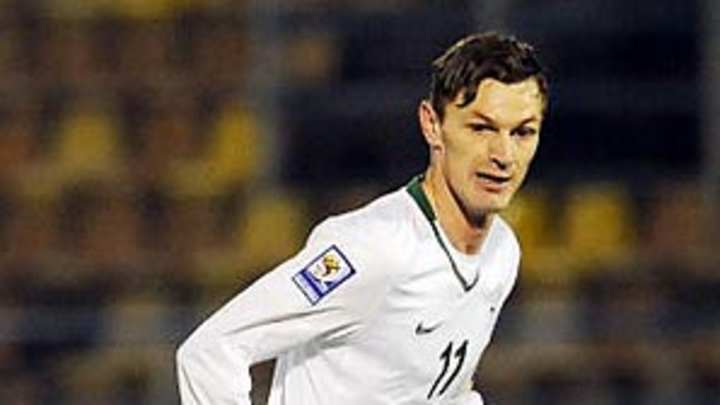Kek's Slovenia unified in team spirit unlike its 2002 predecessors

When Slovenia qualified in 2002, it was staggering, not just because of the size of the country (population size approximately two million), but because it had shown little previous interest in any sport that didn't involve hurtling down a mountain very fast. It felt like a once-in-a-lifetime achievement. Yet somehow Slovenia have done it again, but unlike Northern Ireland, it has done it with a different manager and with an entirely different squad. Lightning has stuck twice.
There has, understandably, been a lot of talk about reliving the fairytale, and yet the truth is that Slovenia's experience in the 2002 World Cup was pretty miserable. The fairytale for it had been Euro 2000, when the Slovenians were a happy-go-lucky bunch who drew two of their three games, lost narrowly to Spain and at one point led the rump Yugoslavia 3-0. What happened in South Korea in '02, rather, was the chastening collapse of that generation, something signaled as its coach, Srecko Katanec, spoke gloomily of how "the cycle finishes" after defeat to Spain in its opening game, and made manifest by the cataclysmic falling out between him and his best player, Zlatko Zahovic. The repercussions of that spat still echo through Slovenian football.
"You're a p---k of a coach and you were a p---k of a player," Zahovic ranted. "I could buy you, your house and your family." It wasn't quite in the league of Roy Keane's profanity-laden deconstruction of Mick McCarthy at the same tournament, but it wasn't far off and it, just as surely, led to a nation's best player leaving his squad and taking its hopes with him.
Slovenia World Cup profile
Katanec was disciplined, ascetic, a believer in the primacy of the team; as a player he had represented the characteristic Slovenian virtues of solidity and industry (although both his parents were Croatian). Zahovic, by contrast, was a free spirit, technically-gifted, individualistic. Both carried unhelpfully large egos. There had been tension between them before, but what crystallized it was the age-old rivalry between Ljubljana, the area to the south and west around the capital, and Styria, the area to the north and east around Maribor. Katanec is Ljubljancan; Zahovic, Styian.
After 63 minutes of Slovenia's opening game, against Spain in Jeju, Katanec replaced Zahovic with Milenko Acimovic. Zahovic slapped hands with the substitute and then, in frustration, kicked out at a bottle of water. Exactly what he said as he then walked past Katanec remains disputed, but everybody agrees it was something along the lines of, "That's right, put on another Ljubljancan."
Acimovic was the definition of a Ljubljancan. Not only had he been born in the capital and played for Olimpija, the biggest club there, but his father has been groundsman at the Bezigad, the stadium where Olimpija and Slovenia played their home matches. Even a plea from the prime minister, Milan Kucan, couldn't reconcile Katanec and Zahovic.
In the fallout that followed Zahovic's subsequent departure, it emerged that there was a feeling among certain players that Katanec always favored Ljubljancans. The Viole, the hard-core of Maribor fans, then protested that the Slovenia Football Federation (NZS) had subsidized the Green Dragons, Olimpija's ultras, to travel to South Korea to support Slovenia. "We are always prepared to help organized fans," Rudi Zavrl, the NZS president replied. "The Green Dragons asked us about a subsidy, and nobody else did."
This time, the Viole will be in South Africa in force, for if Slovenia's qualification in 2002 felt to some like Ljubljancan triumph, this time the success has been very much rooted in Styria. The coach, the unassuming Matjaz Kek, is a former Maribor player and manager; the captain, Robert Koren, was born in Maribor; and Slovenia, having been forced to move away from the crumbling Bezigrad, now plays home games in Maribor's tight and modern stadium, Ljudski vrt. "It was very much needed for a small country like Slovenia," said Kek. "The people in Maribor make a very good atmosphere, and our results there have been excellent."
Just as much as Katanec, Kek is a coach who insists of humility and industry. "We have a very young team and we must work and try very hard in training," he said. "We have discipline and great motivation. We're a small country but we have the chance to do something good."
He does not have a player as talented or individualistic as Zahovic, who played for Porto, Olympiacos, Valencia and Benfica, but while that certainly restricts Slovenia as an attacking force, it is probably no bad thing for the harmony of the squad. When the Bochum forward Zlatko Dedic was asked recently who Slovenia's dangerman is, a look of bafflement crossed his face. "I would not point out any individuals," he said. "We are very strong collectively. If we all work for the team we can be successful at the World Cup." In just about any other country, a journalist would curse a player for being so unhelpful; in Slovenia's case, though, Dedic was simply being honest. Dedic's strike partner, Milivoje Novakovic, who plays for FC Koln, is probably its highest-profile player.
The sense is that, having rather messed up the World Cup eight years ago, Slovenia is simply grateful to have a chance to superimpose some positive memories while at the same time gaining some publicity for a country that is often overlooked. "Qualifying again is something we could only dream about," said Kek. "It's very important for the whole country. Our nation has only existed for 20 years and every win in sport can help make sure that people around the world have heard of us."
